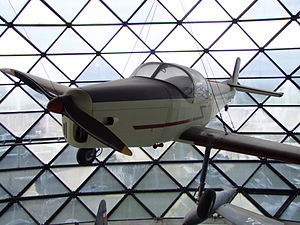LIBIS KB-6
 From Wikipedia the free encyclopedia
From Wikipedia the free encyclopedia
| KB-6 Matajur | |
|---|---|
 | |
| Role | Two-seat light basic trainer and touring aircraft |
| Manufacturer | LIBIS aircraft (Letalski Inštitut Branko Ivanuš Slovenija) |
| Designer | Dušan Cener |
| First flight | 4 June 1952 |
| Status | Retired |
| Primary user | Slovenian aero clubs |
The LIBIS KB-6 Matajur was a 1950s Slovenian two-seat light monoplane designed and produced by LIBIS aircraft during Yugoslavian period.
Design and development[edit]
The aircraft design office of LIBIS brought together teachers and students of the Ljubljana technical high school. The design office designed the KB-6 Matajur which was a two-seat light trainer and tourer that first flew on 4 June 1952. The KB-6 was a cantilever low-wing monoplane with fixed tailwheel landing gear and an enclosed cockpit with side-by-side seating and dual controls. The aircraft was produced for use in aero-clubs until the mid-1960s.
Variants[edit]
- KB-6 Matajur
- Main production variant, powered by a 135 hp (101 kW) Regnier 4L.00 inline engine.
- KB-6T Matajur-Trised
- Three-seat development powered by a 160 hp (120 kW) Walter Minor 6-III-J inline engine, eight built.[1]
- LIBIS 160
- Further developed version of the KB-6T with swept vertical tail, 11 built.[1]
Specifications (KB-6)[edit]
Data from Jane's All The World's Aircraft 1953-54[2]
General characteristics
- Crew: 2
- Length: 8.36 m (27 ft 5 in)
- Wingspan: 10.60 m (34 ft 9 in)
- Height: 2.15 m (7 ft 1 in)
- Wing area: 14.0 m2 (151 sq ft)
- Aspect ratio: 8:1
- Empty weight: 659 kg (1,453 lb)
- Gross weight: 979 kg (2,158 lb)
- Fuel capacity: 141 L (37 US gal; 31 imp gal)
- Powerplant: 1 × Régnier 4L.00 inverted four-cylinder air-cooled inline piston engine, 101 kW (135 hp)
- Propellers: 2-bladed fixed pitch wooden propeller, 1.95 m (6 ft 5 in) diameter
Performance
- Maximum speed: 222 km/h (138 mph, 120 kn) at sea level
- Cruise speed: 200 km/h (120 mph, 110 kn)
- Stall speed: 88 km/h (55 mph, 48 kn) (flaps down)
- Range: 820 km (510 mi, 440 nmi)
- Service ceiling: 4,500 m (14,800 ft)
- Rate of climb: 3.50 m/s (689 ft/min)
Notes[edit]
References[edit]
- The Illustrated Encyclopedia of Aircraft (Part Work 1982-1985). Orbis Publishing.
- Bridgman, Leonard, ed. (1953). Jane's All The World's Aircraft 1953-54. London: Jane's.
- Taylor, John W R (1964). Jane's All the World's Aircraft 1964-65. London: Sampson Low, Marston & Co. Ltd.